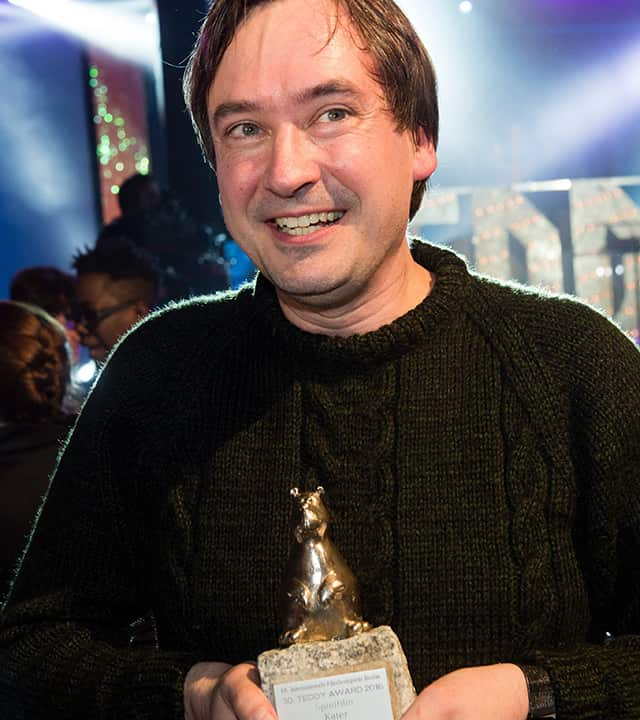Before the Berlin International Film Festival even began, Teddy Award organiser Wieland Speck was talking up Tomcat. On the weekend the nine-member Teddy jury thought likewise, and decided to give Handl Klaus's second feature the Teddy for best film at the 30th anniversary ceremony.
The event was held at The Station, a vast building that was once part of the nearby Gleisdreieck station, now only used for U-Bahn. In other words, very underground Berlin.
The ceremony’s drag hostesses stole the show. David Bowie anthems played throughout the proceedings while supporters including James Franco and past winners like Tilda Swinton and Rose Troche sent their best wishes via Skype.
Tomcat shows how an unexpected violent impulse shatters the contentment of a Viennese gay couple. Featuring Klaus’s luxuriating cat Max front and centre, the film won because the director “uses his furry star to expose the violence lurking under the surface of a seemingly idyllic life.”
Overcome with emotion Klaus said he was “happy, happy, happy” in his acceptance speech, while cuddling everyone in sight, particularly Ira Sachs who awarded him the prize. “He’s a hero of mine.” (Sachs’s wonderful Little Men, about two young boys and not overtly relating to LGBT themes, also screened at the festival.)
“It’s bliss to see Max on screen,” Klaus admitted. “I can’t wait to take the award home to him.”

The Special Jury Prize went to You Will Never Be Alone by first time Chilean writer-director Alex Anwandter already an accomplished musician. His film was inspired by a tragic incident of a gay hate crime in Santiago and he noted in his acceptance speech how a similar incident is now prominent in the news. We had spoken during the festival when he had explained how he had wanted to offer a different perspective telling the story from the viewpoint of the boy’s distressed father played by masterly veteran Sergio Hernández from Gloria.
The jury commended Anwandter for the idea that “it is not the homosexual who is perverse, but the society in which he lives.”
The audience Teddy award went to the French film Paris 05:59 by Oliver Ducastel and Jacques Martineau. It tells of two men falling in love after they have sex in a gay bar and then cycle around Paris. It was partly filmed around the Canal St Martin near the recent terror attacks and near where the directors live. The former longtime couple who work in French academia are happy to share the spoils. They had previously won the Jury Teddy Award for The Adventures of Felix.
“I got to keep the first Teddy and Oliver can have this one”, chimed Martineau while accepting the award. When I spoke to the men earlier that day they said they had travelled to the Melbourne Film Festival on two occasions with their previous films, though this one is by far their most adventurous--and the most difficult to finance.
The Teddy for best documentary went to the US-Swedish film Sara Jordenö’s Kiki, which the jury noted “celebrates the ongoing strength of New York´s ballroom culture by revisiting the influential queer classic Paris is Burning. We are granted intimate access to the lives of young voguers who, like those before them, create chosen families within a network of Houses. But unlike those before them, they aren’t simply surviving—they´re thriving. Through their fierce performances, these young people of colour demonstrate that gender is a broad spectrum and that reinvention is essential to living your life.”
Christine Vachon garnered this year’s Special Teddy award for her achievements as a producer, which started with Todd Hayne’s Poison, the winner for best film at the Teddies in 1991 and whose subsequent films include Rose Troche’s 1994 Teddy winner Go Fish and John Cameron Mitchell’s 2001 Teddy winner Hedwig and the Angry Inch.
“I want this sward to be about 30 years of Teddy,” Vachon told the crowd, who had given her a standing ovation. “I started working during the AIDS crisis when there was a tremendous sense of urgency and when it was important to share our experiences in movies and to share them with different cultures. Without the Teddy and Berlin my films would not have been so widely seen.
